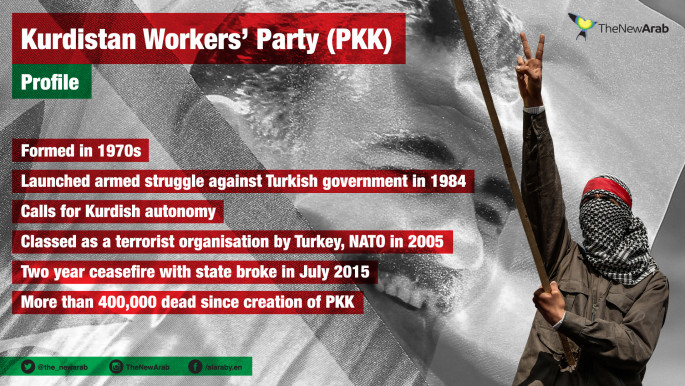Iraqi-Turkish agreement falters amid plans for 'Operation Tigris Shield'
The terms of the deal saw the Iraqi government agree to the removal of PKK fighters from the northern Iraqi region of Sinjar, the Iraqi minister who spoke to The New Arab on condition of anonymity, said.
Iraq also agreed to secure the Turkish-Iraqi border to prevent "terrorist attacks" against Turkey from both PKK fighters and Islamic State [IS] militants while in return the Turkish government agreed to withdraw ground forces currently stationed northwest of Mosul, the minister added.
The presence of Turkish troops in Bashiqa led to major strains between the Iraqi and Turkish governments last year with Iraq calling the presence of Turkish troops "a violation" of Iraqi territory and "interference" in internal affairs.
While Turkey maintained the legitimacy of its presence in Bashiqa on the back of a claim of an invitation by regional authorities, the escalation led to hostile public exchanges between Turkish President Recep Tayyip Erdogan and Iraqi Prime Minister Haider al-Abadi.
 |
Turkey, which fought a bloody three-decade war against PKK militants in the south-east of its country, has long held the presence of PKK militants in the Qandil regions of northern Iraq as a major security risk claiming the region serves a major hub and haven for PKK fighters.
Turkey has in the past conducted cross-border raids and airstrikes against suspected PKK bases in the mountainous region.
Tensions between Iraqi and Turkish government also escalated late in 2016 over to the role of Turkish troops in the battle for Mosul against Islamic State [IS] group militants.
While the visit of Turkish Prime Minister Binali Yildirim to Iraq in January was heralded as a diplomatic breakthrough, the senior Iraqi minister told The New Arab that negotiations between the Iraqi government and PKK militants have seemingly stuttered.
"Three government delegations held meetings with PKK militants and urged them to withdraw from the city of Sinjar and 39 villages surrounding it, and return to the Kurdish stronghold of Qandil Mountains near the Iraq-Iran border," the minister said.
The Kurdish Regional Government [KRG] – the official body ruling the predominantly Kurdish region of northern Iraq – was also involved in the negotiations over PKK withdrawal, the minister added.
"Erbil is also working hard on removing PKK militants, numbered at about 2,000 fighters from Sinjar, and who are armed with medium-heavy weapons, including medium range missiles."
The continued presence of PKK fighters in the Sinjar region as well as in other areas of the mountainous Turkish-Iraqi border region has been the cause of escalating tensions and sporadic fighting between the PKK and the KRG.
The ministry of Peshmerga affairs in the KRG accused the PKK of violating the sovereignty of the territory by independently targeting Turkey with militant attacks resulting in retaliatory airstrikes.
Meanwhile leaders of the PKK describe the KRG and its president Massoud Barzani as "traitors of the Kurdish cause" over their "alliance with Turkey and maintaining a good relationship with Ankara".
According to the Iraqi minister who spoke to The New Arab, Ankara considers the presence of PKK fighters in Sinjar a threat to its security, as some PKK are located some 60 kilometres (37 miles) away from the town of Khabur, just a few kilometres from the three way border crossing that connects Iraq, Syria and Turkey.
 |
Operation Tigris Shield
As the agreement between Iraq and Turkey stutters, Turkish media have circulated leaked reports from sources close to the ruling Justice and Development Party (AKP) saying preparations are underway for possible further Turkish intervention in northern Iraq.
Called "Operation Tigris Shield" – reflecting the "Operation Euphrates Shield" launched by Turkey and FSA regiments in Syria last year – the alleged plan for the Turkish campaign in Iraq includes securing banks of the Tigris river around the town of Khabur currently in proximity to PKK forces.
The Iraqi government has not yet commented on the leaked plans and Iraqi government spokesman Saad al-Hadithi made no remarks when The New Arab questioned him about the reports over telephone.
However, sources close to Baghdad indicate that the Iraqi government has been in contact with US officials and has called for a suspension of the proposed Turkish plans, which Baghdad regards as an attack to its sovereignty and an embarrassment for Abadi.
Sources also said Ankara, which appears likely to begin steps on the operation following a vote on constitutional reforms on Sunday, has sent a clear message to the Iraqi government saying "If Baghdad wants to stop the operation, it must expel the militants who pose a threat to the security and safety of Turkey".
If a political agreement is reached and Baghdad is able give Turkey guarantees, then the campaign may not go through, Hama Amin, a senior official in the KRG told The New Arab.
Turkey seeks to protect the security of its country while also ensuring no demographic changes take place in the Nineveh province that may disadvantage Turkmen and Sunni Arabs, Amin said.
The US may be able to convince Ankara to abandon its plans for a campaign as well as convince Baghdad to expel the PKK militants, Amin added.
While KRG officials and the Turkish government have recently enjoyed increased affinity, statements last week by Turkish President Erdogan on KRG flag-raising in Kirkuk have indicated cracks are also appearing in the Turkey-KRG relationship.
Meanwhile, the head of the Iraqi parliamentary Security and Defence Committee, Hakim al-Zamili, warned Turkey that it cannot repeat what it did in Syria in Iraq.
"Any Turkish military operation or campaigns inside Iraq will not be tolerated, and will be considered as the beginning of the division of Iraq, which we will now allow," Zamili said.
"The international community knows very well that Iraq cannot politically bear such a futile intervention."





 Follow the Middle East's top stories in English at The New Arab on Google News
Follow the Middle East's top stories in English at The New Arab on Google News


